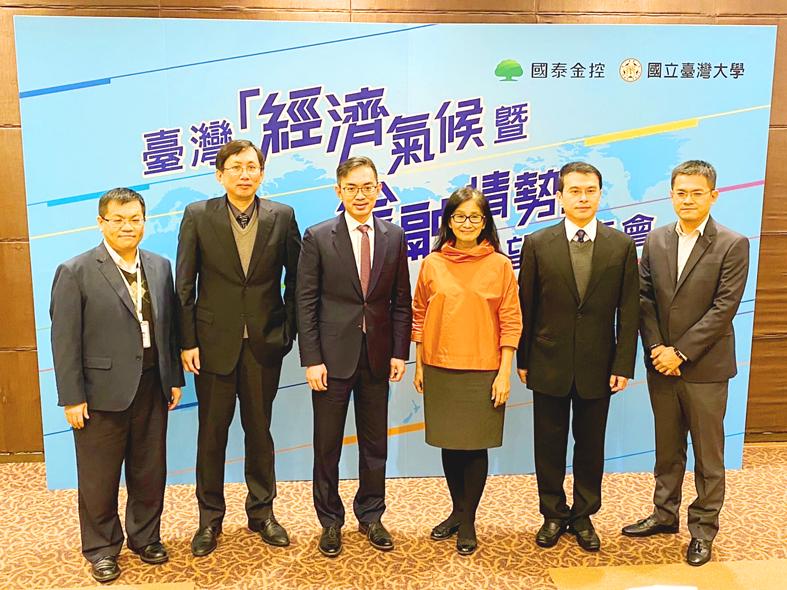Cathay Financial Holding Co (國泰金控) yesterday raised its GDP growth forecast for Taiwan to 6.1 percent for this year and 3.9 percent for next year, citing a recovery in private consumption and continued growth in exports.
In September, the firm forecast growth of 5.6 percent for this year and 3.5 percent for next year.
Although the uncertainty of the COVID-19 pandemic persists, domestic consumption has significantly recovered in the fourth quarter, alleviating most economists’ main concerns regarding the local economy this year, said National Central University economics professor Hsu Chih-chiang (徐之強), who heads a research team commissioned by Cathay Financial.

Photo: Allen Wu, Taipei Times
Retail sales rebounded to NT$373 billion (US$13.46 billion) in October and NT$375.4 billion last month, following five consecutive months of annual decline due to the implementation of a level 3 COVID-19 alert starting in May, Ministry of Economic Affairs data showed.
Despite power rationing in China and a slowing economy in the US, the nation’s exports in the fourth quarter continued to increase by a double-digit percentage thanks to robust demand for technology products amid a digitalization trend, Cathay Financial said.
Since June, exports have hit record highs, with total outbound shipments in the first 11 months of the year advancing 30 percent to US$405.7 billion from a year earlier, Ministry of Finance data showed.
“Next year, we expect domestic consumption to be the driver of economic growth. Exports are expected to keep their growth momentum, but are likely to grow at a slower pace due to this year’s high comparison base,” Hsu said.
Cathay Financial forecast that Taiwan’s economy would expand 3 percent in the first half of next year and 5 percent in the second half, he added.
Next year, the central bank is likely to raise interest rates, given that the US Federal Reserve plans to do so in June at the earliest and considering the rise in inflation, Hsu said.
“It has been 10 years since the last time that the central bank raised its rates, and according to the rule of thumb, it usually hikes rates at a slower pace than when it lowers rates,” he added.
The central bank is likely to raise rates multiple times by 12.5 basis points each time, unless inflation becomes more severe, he said.

South Korea’s equity benchmark yesterday crossed a new milestone just a month after surpassing the once-unthinkable 5,000 mark as surging global memory demand powers the country’s biggest chipmakers. The KOSPI advanced as much as 2.6 percent to a record 6,123, with Samsung Electronics Co and SK Hynix Inc each gaining more than 2 percent. With the benchmark now up 45 percent this year, South Korea’s stock market capitalization has also moved past France’s, following last month’s overtaking of Germany’s. Long overlooked by foreign funds, despite being undervalued, South Korean stocks have now emerged as clear winners in the global market. The so-called “artificial intelligence

‘SEISMIC SHIFT’: The researcher forecast there would be about 1.1 billion mobile shipments this year, down from 1.26 billion the prior year and erasing years of gains The global smartphone market is expected to contract 12.9 percent this year due to the unprecedented memorychip shortage, marking “a crisis like no other,” researcher International Data Corp (IDC) said. The new forecast, a dramatic revision down from earlier estimates, gives the latest accounting of the ongoing memory crunch that is affecting every corner of the electronics industry. The demand for advanced memory to power artificial intelligence (AI) tasks has drained global supply until well into next year and jeopardizes the business model of many smartphone makers. IDC forecast about 1.1 billion mobile shipments this year, down from 1.26 billion the prior

Chinese artificial intelligence (AI) start-up DeepSeek’s (深度求索) latest AI model, set to be released as soon as next week, was trained on Nvidia Corp’s most advanced AI chip, the Blackwell, a senior official of US President Donald Trump’s administration said on Monday, in what could represent a violation of US export controls. The US believes DeepSeek will remove the technical indicators that might reveal its use of American AI chips, the official said, adding that the Blackwells are likely clustered at its data center in Inner Mongolia, an autonomous region of China. The person declined to say how the US government received

People stand in a Pokemon store in Tokyo on Thursday. One of the world highest-grossing franchises is celebrated its 30th anniversary yesterday.